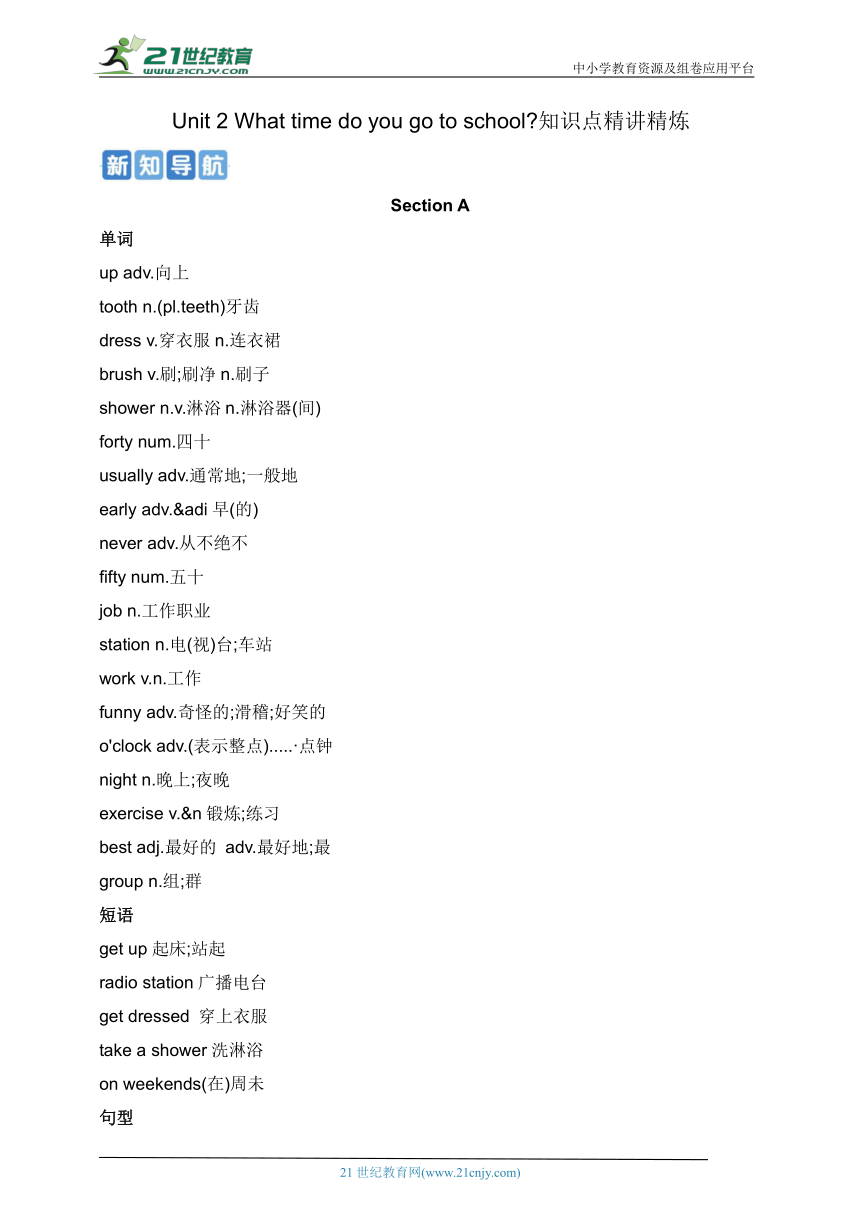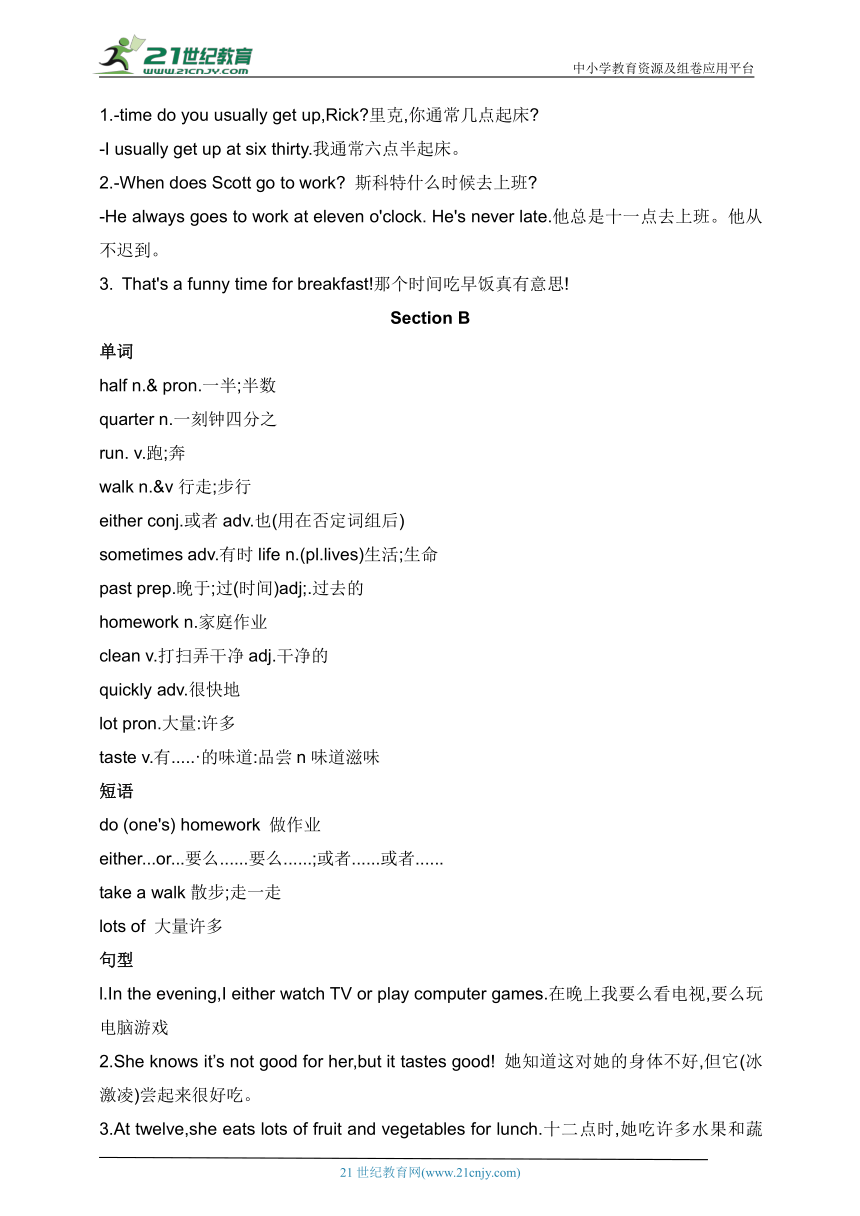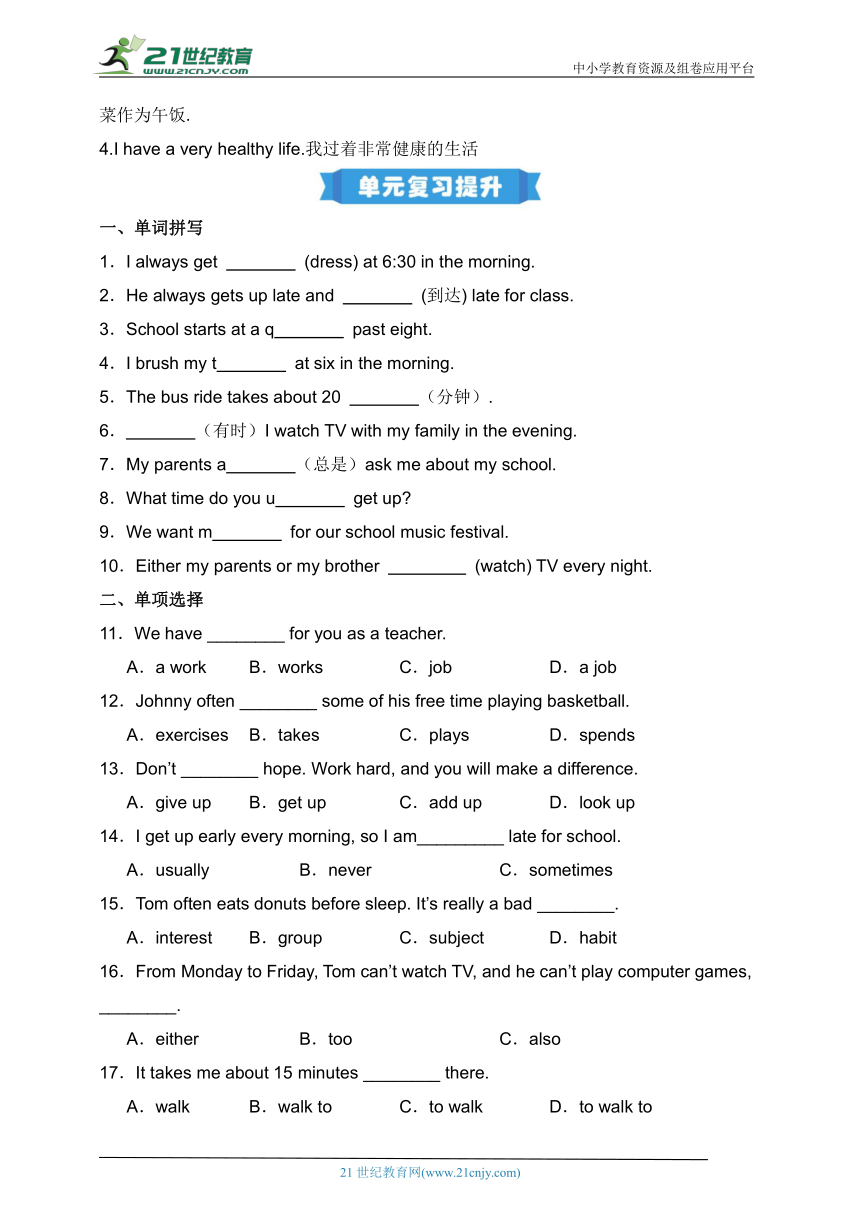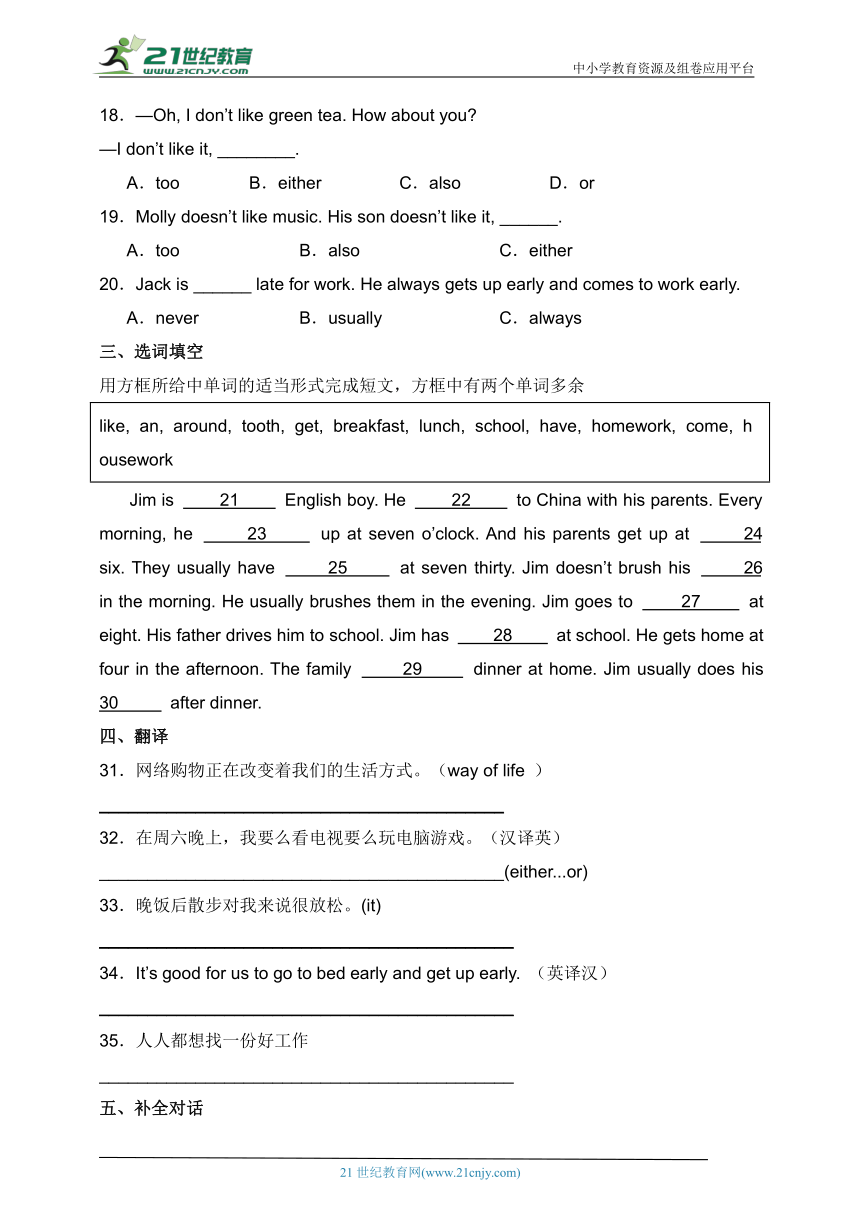Unit 2 What time do you go to school知识点精讲精炼-七年级英语下学期(人教新目标版)
文档属性
| 名称 | Unit 2 What time do you go to school知识点精讲精炼-七年级英语下学期(人教新目标版) |

|
|
| 格式 | doc | ||
| 文件大小 | 1.2MB | ||
| 资源类型 | 试卷 | ||
| 版本资源 | 人教新目标(Go for it)版 | ||
| 科目 | 英语 | ||
| 更新时间 | 2024-02-18 00:00:00 | ||
图片预览




文档简介
中小学教育资源及组卷应用平台
Unit 2 What time do you go to school 知识点精讲精炼
Section A
单词
up adv.向上
tooth n.(pl.teeth)牙齿
dress v.穿衣服n.连衣裙
brush v.刷;刷净n.刷子
shower n.v.淋浴n.淋浴器(间)
forty num.四十
usually adv.通常地;一般地
early adv.&adi早(的)
never adv.从不绝不
fifty num.五十
job n.工作职业
station n.电(视)台;车站
work v.n.工作
funny adv.奇怪的;滑稽;好笑的
o'clock adv.(表示整点).....·点钟
night n.晚上;夜晚
exercise v.&n锻炼;练习
best adj.最好的 adv.最好地;最
group n.组;群
短语
get up起床;站起
radio station广播电台
get dressed 穿上衣服
take a shower洗淋浴
on weekends(在)周未
句型
1.-time do you usually get up,Rick 里克,你通常几点起床
-I usually get up at six thirty.我通常六点半起床。
2.-When does Scott go to work 斯科特什么时候去上班
-He always goes to work at eleven o'clock. He's never late.他总是十一点去上班。他从不迟到。
That's a funny time for breakfast!那个时间吃早饭真有意思!
Section B
单词
half n.& pron.一半;半数
quarter n.一刻钟四分之
run. v.跑;奔
walk n.&v行走;步行
either conj.或者adv.也(用在否定词组后)
sometimes adv.有时life n.(pl.lives)生活;生命
past prep.晚于;过(时间)adj;.过去的
homework n.家庭作业
clean v.打扫弄干净adj.干净的
quickly adv.很快地
lot pron.大量:许多
taste v.有.....·的味道:品尝n味道滋味
短语
do (one's) homework 做作业
either...or...要么......要么......;或者......或者......
take a walk散步;走一走
lots of 大量许多
句型
l.In the evening,I either watch TV or play computer games.在晚上我要么看电视,要么玩电脑游戏
2.She knows it’s not good for her,but it tastes good! 她知道这对她的身体不好,但它(冰激凌)尝起来很好吃。
3.At twelve,she eats lots of fruit and vegetables for lunch.十二点时,她吃许多水果和蔬菜作为午饭.
4.I have a very healthy life.我过着非常健康的生活
一、单词拼写
1.I always get (dress) at 6:30 in the morning.
2.He always gets up late and (到达) late for class.
3.School starts at a q past eight.
4.I brush my t at six in the morning.
5.The bus ride takes about 20 (分钟).
6. (有时)I watch TV with my family in the evening.
7.My parents a (总是)ask me about my school.
8.What time do you u get up
9.We want m for our school music festival.
10.Either my parents or my brother (watch) TV every night.
二、单项选择
11.We have ________ for you as a teacher.
A.a work B.works C.job D.a job
12.Johnny often ________ some of his free time playing basketball.
A.exercises B.takes C.plays D.spends
13.Don’t ________ hope. Work hard, and you will make a difference.
A.give up B.get up C.add up D.look up
14.I get up early every morning, so I am_________ late for school.
A.usually B.never C.sometimes
15.Tom often eats donuts before sleep. It’s really a bad ________.
A.interest B.group C.subject D.habit
16.From Monday to Friday, Tom can’t watch TV, and he can’t play computer games, ________.
A.either B.too C.also
17.It takes me about 15 minutes ________ there.
A.walk B.walk to C.to walk D.to walk to
18.—Oh, I don’t like green tea. How about you
—I don’t like it, ________.
A.too B.either C.also D.or
19.Molly doesn’t like music. His son doesn’t like it, ______.
A.too B.also C.either
20.Jack is ______ late for work. He always gets up early and comes to work early.
A.never B.usually C.always
三、选词填空
用方框所给中单词的适当形式完成短文,方框中有两个单词多余
like, an, around, tooth, get, breakfast, lunch, school, have, homework, come, housework
Jim is 21 English boy. He 22 to China with his parents. Every morning, he 23 up at seven o’clock. And his parents get up at 24 six. They usually have 25 at seven thirty. Jim doesn’t brush his 26 in the morning. He usually brushes them in the evening. Jim goes to 27 at eight. His father drives him to school. Jim has 28 at school. He gets home at four in the afternoon. The family 29 dinner at home. Jim usually does his 30 after dinner.
四、翻译
31.网络购物正在改变着我们的生活方式。(way of life )
__________________________________________
32.在周六晚上,我要么看电视要么玩电脑游戏。(汉译英)
__________________________________________(either...or)
晚饭后散步对我来说很放松。(it)
___________________________________________
34.It’s good for us to go to bed early and get up early. (英译汉)
___________________________________________
35.人人都想找一份好工作
___________________________________________
五、补全对话
根据对话情景填入适当的句子补全对话。
A: Hello, Maria. Can I ask you some questions about your school life
B: Sure.
A: 36
B: I usually get up at half past six. Then I run for thirty minutes.
A: 37
B: At school. I always have some bread, milk and eggs in the morning.
A: 38
B: Well, I have lunch at twelve o’clock.
A: 39
B: I eat lots of fruit and vegetables for lunch.
A: 40
B: I go to the tennis club to practice(练习) tennis after school. I go home at five.
A: Thanks a lot.
B: You’re welcome.
六、阅读理解
School Rules in the World
Every school has its own rules. Some rules are the same. But some are different. Here are some school rules.
●Strict Japanese rules
Many Japanese schools ask students to wear uniforms. Some schools tell students they cannot go to the movies, leave home at night or play computer games at home on school days.
●Different shoes in the US
At some schools in the US, students must wear a pair of indoor (室内的) shoes at school every day. This can keep the school clean.
●No strange (奇怪的) hairstyles (发型) in the UK
In some English schools, students can’t wear strange hairstyles. But the students can wear strange hairstyles in the World Cup years.
41.What can’t some Japanese students do on school days according to (根据) the rules
A.They can’t wear school uniforms. B.They can’t watch TV.
C.They can’t play with friends. D.They can’t leave home at night.
42.What must American students in some schools wear to keep the school clean
A.Sports shoes. B.Indoor shoes. C.Outdoor shoes. D.Uniforms.
43.Can students in the UK wear strange hairstyles in the World Cup years
A.Yes, they can. B.No, they can’t. C.We don’t know. D.Only boys can.
44.Which is TRUE according to the passage
A.All of the rules in American schools are strict.
B.Rules of all the schools are the same.
C.Japanese students in some schools can’t go to the movies on school days.
D.The English schools never allow (允许) students to have strange hairstyles.
45.The purpose (目的) of the passage is to _________.
A.show how strange these countries are
B.show some school rules in different countries
C.ask students to follow the school rules
D.ask students not to wear uniforms at school
参考答案:
1.dressed 2.arrives 3.(q)uarter 4.(t)eeth 5.minutes 6.sometimes
7.(a)lways 8.(u)sually 9.(m)usicians 10.watches
11.D 12.D 13.A 14.B 15.D 16.A 17.C 18.B 19.C 20.A
21.an 22.comes 23.gets 24.around 25.breakfast 26.teeth 27.school 28.lunch 29.have 30.homework
31.Online shopping is changing our way of life.
32.I either watch TV or play computer games on Saturday evening(s)/night(s).
33.It is relaxing for me to take a walk after dinner.
34.早睡早起对我们有好处。
35.Everyone wants to find a good job
36.When/What time do you usually get up 37.Where do you have breakfast 38.When/What time do you have lunch 39.What do you eat/have for lunch 40.What do you do after school
41.D 42.B 43.A 44.C 45.B
21世纪教育网 www.21cnjy.com 精品试卷·第 2 页 (共 2 页)
HYPERLINK "http://21世纪教育网(www.21cnjy.com)
" 21世纪教育网(www.21cnjy.com)
Unit 2 What time do you go to school 知识点精讲精炼
Section A
单词
up adv.向上
tooth n.(pl.teeth)牙齿
dress v.穿衣服n.连衣裙
brush v.刷;刷净n.刷子
shower n.v.淋浴n.淋浴器(间)
forty num.四十
usually adv.通常地;一般地
early adv.&adi早(的)
never adv.从不绝不
fifty num.五十
job n.工作职业
station n.电(视)台;车站
work v.n.工作
funny adv.奇怪的;滑稽;好笑的
o'clock adv.(表示整点).....·点钟
night n.晚上;夜晚
exercise v.&n锻炼;练习
best adj.最好的 adv.最好地;最
group n.组;群
短语
get up起床;站起
radio station广播电台
get dressed 穿上衣服
take a shower洗淋浴
on weekends(在)周未
句型
1.-time do you usually get up,Rick 里克,你通常几点起床
-I usually get up at six thirty.我通常六点半起床。
2.-When does Scott go to work 斯科特什么时候去上班
-He always goes to work at eleven o'clock. He's never late.他总是十一点去上班。他从不迟到。
That's a funny time for breakfast!那个时间吃早饭真有意思!
Section B
单词
half n.& pron.一半;半数
quarter n.一刻钟四分之
run. v.跑;奔
walk n.&v行走;步行
either conj.或者adv.也(用在否定词组后)
sometimes adv.有时life n.(pl.lives)生活;生命
past prep.晚于;过(时间)adj;.过去的
homework n.家庭作业
clean v.打扫弄干净adj.干净的
quickly adv.很快地
lot pron.大量:许多
taste v.有.....·的味道:品尝n味道滋味
短语
do (one's) homework 做作业
either...or...要么......要么......;或者......或者......
take a walk散步;走一走
lots of 大量许多
句型
l.In the evening,I either watch TV or play computer games.在晚上我要么看电视,要么玩电脑游戏
2.She knows it’s not good for her,but it tastes good! 她知道这对她的身体不好,但它(冰激凌)尝起来很好吃。
3.At twelve,she eats lots of fruit and vegetables for lunch.十二点时,她吃许多水果和蔬菜作为午饭.
4.I have a very healthy life.我过着非常健康的生活
一、单词拼写
1.I always get (dress) at 6:30 in the morning.
2.He always gets up late and (到达) late for class.
3.School starts at a q past eight.
4.I brush my t at six in the morning.
5.The bus ride takes about 20 (分钟).
6. (有时)I watch TV with my family in the evening.
7.My parents a (总是)ask me about my school.
8.What time do you u get up
9.We want m for our school music festival.
10.Either my parents or my brother (watch) TV every night.
二、单项选择
11.We have ________ for you as a teacher.
A.a work B.works C.job D.a job
12.Johnny often ________ some of his free time playing basketball.
A.exercises B.takes C.plays D.spends
13.Don’t ________ hope. Work hard, and you will make a difference.
A.give up B.get up C.add up D.look up
14.I get up early every morning, so I am_________ late for school.
A.usually B.never C.sometimes
15.Tom often eats donuts before sleep. It’s really a bad ________.
A.interest B.group C.subject D.habit
16.From Monday to Friday, Tom can’t watch TV, and he can’t play computer games, ________.
A.either B.too C.also
17.It takes me about 15 minutes ________ there.
A.walk B.walk to C.to walk D.to walk to
18.—Oh, I don’t like green tea. How about you
—I don’t like it, ________.
A.too B.either C.also D.or
19.Molly doesn’t like music. His son doesn’t like it, ______.
A.too B.also C.either
20.Jack is ______ late for work. He always gets up early and comes to work early.
A.never B.usually C.always
三、选词填空
用方框所给中单词的适当形式完成短文,方框中有两个单词多余
like, an, around, tooth, get, breakfast, lunch, school, have, homework, come, housework
Jim is 21 English boy. He 22 to China with his parents. Every morning, he 23 up at seven o’clock. And his parents get up at 24 six. They usually have 25 at seven thirty. Jim doesn’t brush his 26 in the morning. He usually brushes them in the evening. Jim goes to 27 at eight. His father drives him to school. Jim has 28 at school. He gets home at four in the afternoon. The family 29 dinner at home. Jim usually does his 30 after dinner.
四、翻译
31.网络购物正在改变着我们的生活方式。(way of life )
__________________________________________
32.在周六晚上,我要么看电视要么玩电脑游戏。(汉译英)
__________________________________________(either...or)
晚饭后散步对我来说很放松。(it)
___________________________________________
34.It’s good for us to go to bed early and get up early. (英译汉)
___________________________________________
35.人人都想找一份好工作
___________________________________________
五、补全对话
根据对话情景填入适当的句子补全对话。
A: Hello, Maria. Can I ask you some questions about your school life
B: Sure.
A: 36
B: I usually get up at half past six. Then I run for thirty minutes.
A: 37
B: At school. I always have some bread, milk and eggs in the morning.
A: 38
B: Well, I have lunch at twelve o’clock.
A: 39
B: I eat lots of fruit and vegetables for lunch.
A: 40
B: I go to the tennis club to practice(练习) tennis after school. I go home at five.
A: Thanks a lot.
B: You’re welcome.
六、阅读理解
School Rules in the World
Every school has its own rules. Some rules are the same. But some are different. Here are some school rules.
●Strict Japanese rules
Many Japanese schools ask students to wear uniforms. Some schools tell students they cannot go to the movies, leave home at night or play computer games at home on school days.
●Different shoes in the US
At some schools in the US, students must wear a pair of indoor (室内的) shoes at school every day. This can keep the school clean.
●No strange (奇怪的) hairstyles (发型) in the UK
In some English schools, students can’t wear strange hairstyles. But the students can wear strange hairstyles in the World Cup years.
41.What can’t some Japanese students do on school days according to (根据) the rules
A.They can’t wear school uniforms. B.They can’t watch TV.
C.They can’t play with friends. D.They can’t leave home at night.
42.What must American students in some schools wear to keep the school clean
A.Sports shoes. B.Indoor shoes. C.Outdoor shoes. D.Uniforms.
43.Can students in the UK wear strange hairstyles in the World Cup years
A.Yes, they can. B.No, they can’t. C.We don’t know. D.Only boys can.
44.Which is TRUE according to the passage
A.All of the rules in American schools are strict.
B.Rules of all the schools are the same.
C.Japanese students in some schools can’t go to the movies on school days.
D.The English schools never allow (允许) students to have strange hairstyles.
45.The purpose (目的) of the passage is to _________.
A.show how strange these countries are
B.show some school rules in different countries
C.ask students to follow the school rules
D.ask students not to wear uniforms at school
参考答案:
1.dressed 2.arrives 3.(q)uarter 4.(t)eeth 5.minutes 6.sometimes
7.(a)lways 8.(u)sually 9.(m)usicians 10.watches
11.D 12.D 13.A 14.B 15.D 16.A 17.C 18.B 19.C 20.A
21.an 22.comes 23.gets 24.around 25.breakfast 26.teeth 27.school 28.lunch 29.have 30.homework
31.Online shopping is changing our way of life.
32.I either watch TV or play computer games on Saturday evening(s)/night(s).
33.It is relaxing for me to take a walk after dinner.
34.早睡早起对我们有好处。
35.Everyone wants to find a good job
36.When/What time do you usually get up 37.Where do you have breakfast 38.When/What time do you have lunch 39.What do you eat/have for lunch 40.What do you do after school
41.D 42.B 43.A 44.C 45.B
21世纪教育网 www.21cnjy.com 精品试卷·第 2 页 (共 2 页)
HYPERLINK "http://21世纪教育网(www.21cnjy.com)
" 21世纪教育网(www.21cnjy.com)
同课章节目录
- Unit 1 Can you play the guitar?
- Section A
- Section B
- Unit 2 What time do you go to school?
- Section A
- Section B
- Unit 3 How do you get to school?
- Section A
- Section B
- Unit 4 Don't eat in class.
- Section A
- Section B
- Unit 5 Why do you like pandas?
- Section A
- Section B
- Unit 6 I'm watching TV.
- Section A
- Section B
- Review of Units 1-6
- Unit 7 It's raining!
- Section A
- Section B
- Unit 8 Is there a post office near here?
- Section A
- Section B
- Unit 9 What does he look like?
- Section A
- Section B
- Unit 10 I'd like some noodles.
- Section A
- Section B
- Unit 11 How was your school trip?
- Section A
- Section B
- Unit 12 What did you do last weekend?
- Section A
- Section B
